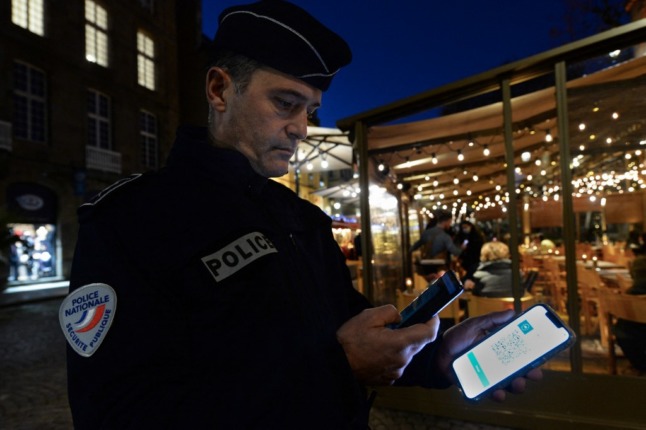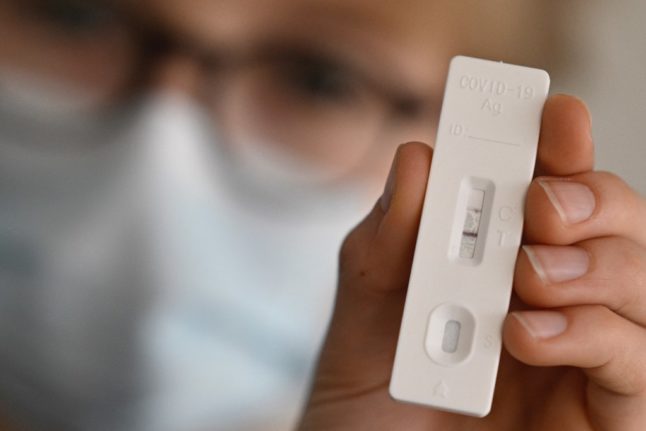The French vaccine pass entered into effect on Monday, January 24th.
What is the vaccine pass?
The vaccine pass (pass vaccinal) replaced the health pass (pass sanitaire).
In brief, it requires proof of vaccination to take part in many everyday activities and the French government has been open about the fact that the intention is to push more people into getting fully vaccinated.
Within a month of the announcement in December about the introduction of the new pass, 1 million adults had a first-dose vaccination, according to Prime Minister Jean Castex.
What does it mean?
Since the summer of 2021, anyone in France must hold a valid health pass to enter various public venues such as cinemas, cafés, bars, restaurants, gyms, leisure centres, museums, concerts, large gatherings, sports matches, long-distance train carriages and to access healthcare venues as a visitor or non-emergency patient.
The health pass was valid if users met any one of the following requirements: full vaccination against Covid-19; proof of recent recovery from Covid-19; or evidence of having tested negative for the virus within the previous 24-hours.
For a vaccine pass, negative tests are not accepted.
Instead you must present either
- Proof of full vaccination (including a booster if applicable, fell details below)
- A certificate of recent recovery from Covid – full details on how to get that HERE
- An attestation de contre-indication – this is a certificate stating that you cannot be vaccinated for medical reasons. This must conform to the French QR code format – full details HERE
How does it work?
The vaccine pass still uses the TousAntiCovid app. So for fully vaccinated people (90 percent of the population of over 12s) nothing changes – you continue to show proof of vaccination either on the app or on paper to enter any health pass venue.
There are some differences though;
The vaccine pass applies only to people aged 16 and over, while the health pass is required for over 12s. Children aged between 12 and 15 can continue to use the health pass by showing proof of a negative Covid test taken with the previous 24 hours.
For people needing to access non-emergency medical care, or attending a health or social establishment (such as a nursing home) as a visitor, there is still the option of showing a negative test if they are not vaccinated.
The pass is required for inter-regional public transport (trains, long-distance buses and domestic flights) but a negative Covid test can be shown instead if there are “imperative reasons of a family or health nature” that an unvaccinated traveller needs to make the journey – such as going to visit a dying relative.
In order to encourage people to get their vaccine, those people who have recently had a first dose will be able to use a combination of their first dose certificate with a negative Covid test.
Unvaccinated people who receive a first dose between January 20th and February 15th will be able to use a combination of their first dose and a negative Covid test in order to access vaccine pass venues. Those who get the first dose after February 15th will have to wait until seven days after their second dose in order to use the vaccine pass.
In order to combat vaccine pass fraud, staff in health pass venues such as waiters can now request ID to confirm that the customer is presenting their own health pass. This was the subject of considerable controversy – normally in France only an employee of the state, such as a police officer, can request ID – and under the bill as passed ID can only be requested “when there are serious reasons to believe that the document presented is not linked to the person presenting it”.
What counts as fully vaccinated?
You count as fully vaccinated in France if you have received two doses of AstraZeneca, Pfizer or Moderna vaccines more than 7 days ago, or a single dose of Janssen 28 days ago.
If you have previously had Covid, a single dose of AstraZeneca, Pfizer or Moderna is accepted.
Boosters
If you had your second dose more than seven months ago (or more than four months from February 15th) you will need to have a booster shot in order to keep your ‘fully vaccinated’ status.
If you have already had the booster, the gap between your second and third doses does not matter.
If you had Covid after getting two shots but before you could get the booster, you can use the positive test result in lieu of a booster shot.
The above definition, including the requirement for booster shots, applies to tourists, visitors and people vaccinated outside France.
For full details on who counts as ‘fully vaccinated’, click here.
What about children?
The health pass already applies to children aged 12-17.
The vaccine pass, however, will only apply to those aged 16 and over, with 12-15 year-olds able to keep showing negative test results – however these cannot be more than 24 hours old.
The health pass is not required for schools.
What if I am just visiting France?
The vaccine pass is required for everyone in France, even if they are only visiting.
Boosters are also required for visitors in order to keep their pass activated.
What if I was vaccinated overseas?
If you were vaccinated within the EU, you will have been issued with a EU Digital Covid Certificate with is fully compatible with the French health pass and will also be compatible with a vaccine pass.
For non-EU nationals, you may be required to ask at a pharmacy to access a vaccine equivalency certificate (unless you are from the UK in which case showing proof on your NHS vaccination app is fine).
Vaccines approved by the European Medicines Agency (Pfizer, Moderna, Astrazenca and Janssen/Johnson & Johnson) are all valid in France.
Vaccines approved by the World Health Organisation but not by the EMA (Covaxin, Sinopharm and Sinovac) are seen as semi-valid for use in France. This means that if you have had two doses of any of these vaccines, you will need to have a single dose of an EMA approved vaccine in order to be considered fully vaccinated.
Sputnik and other vaccines are not recognised in France. You will need to have a full course of EMA approved vaccines in order to use the vaccine pass.
If you tested positive for Covid in an EU country, you can currently scan the result (provided you have a paper copy or QR code) into your TousAntiCovid app. This is the equivalent of receiving one dose of vaccine.
If your positive result comes from a non-EU country, you will not be able to scan the code into the app. The rules state that non-EU positive results are not accepted as a vaccine-substitute in France, but some readers have reported taking their results to either a vaccine centre or a pharmacy and having them added to the app by staff there, although this is not the official policy.
In order to enter the country, you can show a vaccination certificate from any country and a booster is not yet required to enter France.



 Please whitelist us to continue reading.
Please whitelist us to continue reading.
Please clarify: My husband and I have both been fully vaccinated (2 vaccinations) and both have had recent BOOSTER shots. We are frequent travelers to France; we own 47.5 % of an apartment in Paris on I’ll Saint Louis, and frequently rent for two or more weeks in Villefranche-sur-Mer, near Nice.
We also have an extended Family living near Montpelier. We were lucky to visit not only Paris, but also Villefranche, and even Corsica, another of our favorites this summer and early Autun.! We took 2 separate trips from the USA and spent a total of close to 8 weeks. We return to France in January from 12/01/2022 to 31/01/2022. For 35 years I have also escorted trips to France and have written many itineraries for friends and family members as well as traveling with them.
Would our authorized CDC card suffice? We are francophiles and support France not only monetarily but in so much in our lives with our advice and caring! Thank you for your help in advance. Donna Rissone
I’m afraid despite all the francophile stuff, you’re still just a foreigner over here and, even worse, not even EU so I think you best check with your State Department.
Yes, definitely check with the state department. No one else can really know the right answers in these changing times. The length of time you spend in France won’t have any impact on vaccination status. It may be as simple as converting your CDC card to a pass sanitaire, but then again France is proposing going to a vaccine pass versus pass sanitaire..with all the daily changes in travel and who can and can’t enter you’ll need state department advice.
As someone else said – despite the frequency you visit France, you’re still a foreigner without a Carte de Sejour or some other type of id card showing you live in France.
Thank you all for the information!
Hi Donna, hopefully this will answer your question – https://www.thelocal.fr/20220118/reader-question-how-can-i-add-a-non-eu-booster-shot-to-my-french-health-pass/
We have Canadian vaccination pass and the QR code cannot be read by the TousAntiCovid app. We went to one of the pharmacies listed on the government site and the pharmacist converted our Canadian vaccination status to an EU pass sanitaire immediately for us. It did however cost us 35 Euros each.
Thank you , I have a trip planned in February and have all 3 shots but am unable to open the green pass website now. This gives me an alternative.
Did the same with mine earlier this week. Dropped off my Canadian certificate and a few hours later picked up my French equivalent (They were busy so asked for !e to come back). Cost was 36€
Could someone please specify the “government site” that lists pharmacies willing/able to convert a Canadian vaccination certificate to a French vaccine pass.
https://www.sante.fr/recherche/trouver/health%20pass
The list of pharmacies that will convert foreign vaccination certificates to a French Vaccine pass can be found here:
https://www.sante.fr/obtenir-un-passe-vaccinal-en-cas-de-vaccination-letranger
It will be interesting to see what window they give for us to get the booster shot. I am now eligible (as of this morning) and have been trying to book an appointment for the past week in anticipation of this. I did manage to get a slot for the 28th January so am hoping that falls within whatever time they allot us to get the shot.
If you have recently recovered from Covid are you not entitled to a pass? My French doctor refused to vaccinate until 6 months had passed. I assume this still applies? This is what the 2G system entails but not mentioned in the article.
What if an American gets his/her booster shot 6 or 7 months after the second dose and then travels to France? Could he/she be eligible to get the French vaccination pass?
If we are not vaxed are we unable to return to uk?
I travel to France next week. have had my second jab within the last 6 months, but not had a booster yet, will my vaccine pass still be approved?
I don’t think so. You need the booster.
I am traveling to France Feb 5th. I am a US resident but arriving from Switzerland. I was in the Novavax clinical trial (now EMA approved) in the US (both doses in January 2021) – I have had no boosters but contracted Covid (in the US) and tested positive via a PCR on Nov 28th, 2021 (have documentation w/ QR code). I also have written document from primary care stating my positive PCR and I am cleared to travel. will I be able to get a vaccine equivalency certificate?